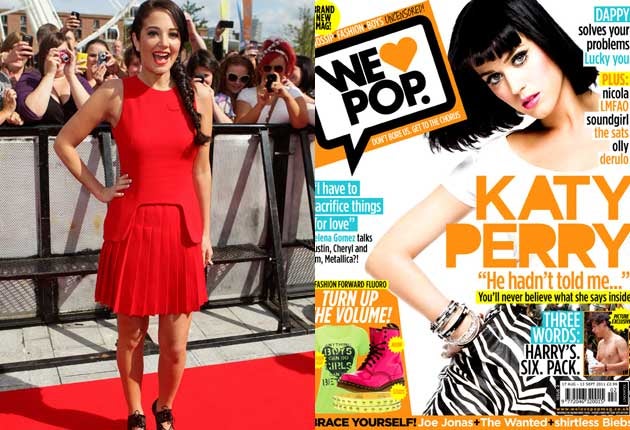Love letter to pop for new era of music fans
We Love Pop is out to fill the gap left by the demise of magazines such as Smash Hits. Luke Blackall reports

Once upon a time, fans of pop music could buy any one of several magazines such as Live and Kicking, Top of the Pops or – perhaps most iconic of all – Smash Hits. For devotees, these magazines and their interviews, posters and lyrics, were the best way to keep up with their favourite stars.
Now, a new publication, We Love Pop, hopes to take the joy of the music magazine back to a new generation of fans. If it proves a success it will represent a remarkable comeback for the genre, of which only Top of the Pops survives.
The teen magazine market has suffered in recent years. In 2006 Smash Hits folded (after 28 years) and the weekly Top of the Pops TV show ended (after 42 years). Much was written about the decline of pop against an onslaught of rock, parent-friendly music and ringtones. Young people had new icons – few of whom were musicians – on which to spend their money. Traditional sales were being eroded by downloads and music television being transformed.
It was also five years ago that the first signs of a new era were coming about. Lily Allen and Amy Winehouse brought with them both credible sounds and lyrics and the sort of marketable, cocky personalities that had been the preserve of rock bands. Since then, pop music has been on the ascendancy, with artists such as Lady Gaga, Beyoncé and Katy Perry doing huge business. More recently, Justin Bieber and JLS have induced the sort of teenage screams last heard when Take That were in their heyday. Elsewhere the TV series Glee has garnered a huge following, its glossy, feel-good cover songs taking fans from the small screen to a big-screen adaptation via money-spinning stage shows. Plus music reality shows such as The X Factor now mean that every year we have a new generation of pop stars thrust on to the scene.
Last month Tony Wadsworth, chairman of the British Phonographic Industry, called on the BBC to bring back a Top of the Pops-style show, saying: "There is a gap and the BBC is missing a trick by not having a show."
We Love Pop's editor, Malcolm Mackenzie, says that today's market needs a magazine that caters to pop tastes. "The Wanted were at No 1 in the singles charts recently – what sort of magazine do you buy if you like The Wanted?" he asks. "Or if you were one of the thousands of girls watching Beyoncé at Glastonbury? There are no music magazines out there that target girls. Girls' magazines featuring music stars tend to be the gossip ones and not about the music."
Mainstream acts, from the big US female stars, to home-grown solo singers, to girl- and boybands are the focus of the monthly magazine. Plus the output from TV talent shows, which resonate with the core audience of girls aged 13-16. The publication distinguishes itself with the sort of slightly surreal, anarchic humour that made Smash Hits stand out. Also back are posters (including a couple on the "Page Forty Phwoar!"), still a staple of the teenage bedroom, which the publishers hope will be a big selling point.
But one thing that is markedly different is the overt sexuality of many of today's music acts. It's an issue that has got some members of the media hot under the collar. We Love Pop attempts to address this with one of its cover stories: "X-Rated: Is Pop Too Rude?". The magazine spoke to both fans and artists, such as Jennifer Lopez, rapper Example and Nicola Roberts.
"We as adults are used to seeing these images," says Mackenzie. "From research, we've found that young people have a very strong moral compass and the feedback was that they did think many of the images were too rude. None of the popstars did, who felt that they were just expressing themselves."
Siobhan Galvin, of publisher Egmont, says: "We've gone into this with our eyes open. Teens have embraced digital media hugely. But there's still a market there and we hope to keep them buying magazines."
Join our commenting forum
Join thought-provoking conversations, follow other Independent readers and see their replies
Comments